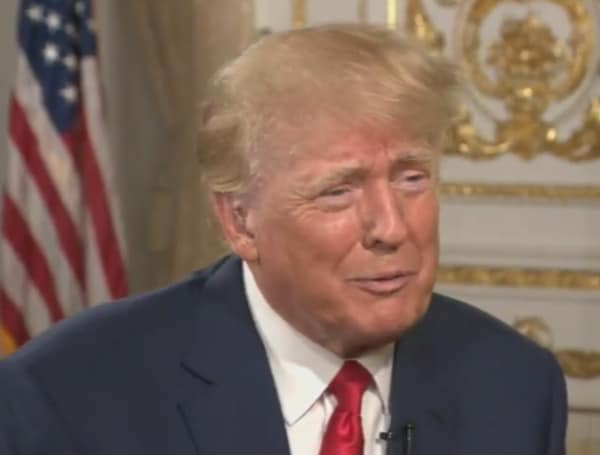Former President Donald Trump claimed that the FBI agents who searched Mar-a-Lago confiscated his last will and testament.
On Wednesday, during an interview with Fox News host Sean Hannity, Trump spoke of the FBI’s court-authorized raid of his Florida home on August 8, which ended in the seizure of more than 11,000 documents.
Of these files, 103 were marked as classified, including 54 labeled “secret” and 18 labeled “top secret.”
But Trump, who has denied mishandling sensitive materials, said his will disappeared in the mix.
“They took a lot,” he told Hannity. “I think they took my will. I found out yesterday—I said, where is it? I think they took my will.”
In the news: Florida CFO Patronis Denounces ‘Big Credit’ Tracking Gun And Ammo Buyers
Hannity responded, “Am I in it?”
Trump responded, “That could cause a lot of problems, if that gets published, from people that won’t be so happy—or maybe will be very happy.”
Trump also said that he declassified sensitive documents, saying that process required no further evidence than a president’s thought.
“You can declassify just by saying it’s declassified, even by thinking about it. Because you’re sending it to Mar-a-Lago or to wherever you’re sending. And it doesn’t have to be a process. There can be a process, but there doesn’t have to be. You’re the president. You make that decision. So when you send it, it’s declassified,” said Trump.
The U.S. Eleventh Circuit Appeals Court allowed the U.S. Department of Justice Wednesday to temporarily use classified-marked documents seized in the FBI’s Mar-a-Lago raid for criminal investigation.
Judge Aileen M. Cannon picked Senior Judge Raymond J. Dearie as special master on Sept. 15 to review everything the raid recovered and examine the FBI’s related conduct.
The circuit court Wednesday approved the government’s request to permit them to keep the materials with classification markings for criminal investigation, pending appeal.
In the news: George Soros Network Bankrolled Activist Group Suing Florida Gov. DeSantis Over “DeSantis Air”
“It is self-evident that the public has a strong interest in ensuring that the storage of the classified records did not result in ‘exceptionally grave damage to the national security,’” the court’s ruling said. “Ascertaining that necessarily involves reviewing the documents, determining who had access to them and when, and deciding which (if any) sources or methods are compromised.”
Cannon’s original order for appointing a special master said the government must temporarily stop using raided documents for criminal investigative purposes. A Justice Department (DOJ) Privilege Review Team that examined raided materials found some might be protected by privilege.
Trump claimed in August that he learned the FBI seized privileged documents in the raid.
Cannon unsealed a list Aug. 30 showing the FBI took dozens of government documents marked “TOP SECRET,” “SECRET” or “CONFIDENTIAL,” as well as empty folders with “CLASSIFIED” banners. She later revealed that medical records, tax-related communications and accounting information were seized.
Visit Tampafp.com for Politics, Sports, and National Headlines. Support journalism by clicking here to our GiveSendGo or sign up for our free newsletter by clicking here.
Android Users, Click Here To Download The Free Press App And Never Miss A Story. Follow Us On Facebook Here Or Twitter Here.
Copyright 2022 The Free Press, LLC, tampafp.com. All rights reserved. This material may not be published, broadcast, rewritten, or redistributed.

